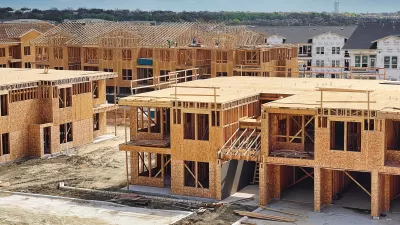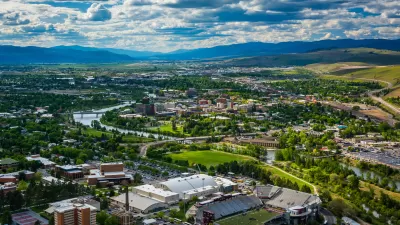The ‘Yes In My Backyard’ grants are designed to help cities identify the most effective avenues for increasing density and spurring more housing construction in historically reluctant neighborhoods.

An $85 million federal grant program included in the omnibus funding package passed late last year aims to counter NIMBY opposition to new housing development and help cities pass zoning reforms that encourage increased housing production, higher density, and transit-oriented development, writes Kery Murakami in Route Fifty.
According to the omnibus, HUD will award grants to cities that demonstrate ‘a commitment to overcoming local barriers to facilitate the increase in affordable housing production and preservation.’ Cities with ‘an acute demand’ for housing affordable to households below the median income in their area will also get preference for the grants.
A prior proposal by President Biden called for federal grants for cities that eliminate ‘exclusionary’ zoning laws, but it was not included in the bipartisan infrastructure law. “However, Biden in his budget request last March called for the creation of a $10 billion state and local grant program to encourage and support zoning changes that would allow more kinds of housing to go up in what are often largely white and wealthier neighborhoods.”
The federal initiative is partly modeled on a Washington state program that awards grants to cities “to examine how their zoning policies were restricting the supply of housing, as a shortage of homes contributed to sharply rising real estate prices.” The program yielded changes to zoning codes in Tacoma, Walla Walla, and other cities.
FULL STORY: The New Federal Grants to Help Cities Ditch 'NIMBY'-backed Zoning

Alabama: Trump Terminates Settlements for Black Communities Harmed By Raw Sewage
Trump deemed the landmark civil rights agreement “illegal DEI and environmental justice policy.”

Planetizen Federal Action Tracker
A weekly monitor of how Trump’s orders and actions are impacting planners and planning in America.

Why Should We Subsidize Public Transportation?
Many public transit agencies face financial stress due to rising costs, declining fare revenue, and declining subsidies. Transit advocates must provide a strong business case for increasing public transit funding.

Understanding Road Diets
An explainer from Momentum highlights the advantages of reducing vehicle lanes in favor of more bike, transit, and pedestrian infrastructure.

New California Law Regulates Warehouse Pollution
A new law tightens building and emissions regulations for large distribution warehouses to mitigate air pollution and traffic in surrounding communities.

Phoenix Announces Opening Date for Light Rail Extension
The South Central extension will connect South Phoenix to downtown and other major hubs starting on June 7.
Urban Design for Planners 1: Software Tools
This six-course series explores essential urban design concepts using open source software and equips planners with the tools they need to participate fully in the urban design process.
Planning for Universal Design
Learn the tools for implementing Universal Design in planning regulations.
Caltrans
Smith Gee Studio
Institute for Housing and Urban Development Studies (IHS)
City of Grandview
Harvard GSD Executive Education
Toledo-Lucas County Plan Commissions
Salt Lake City
NYU Wagner Graduate School of Public Service





























